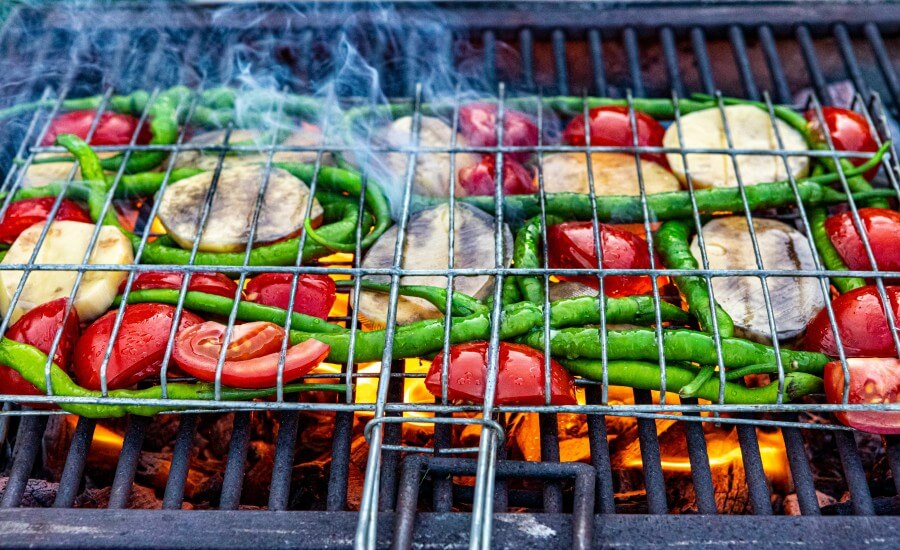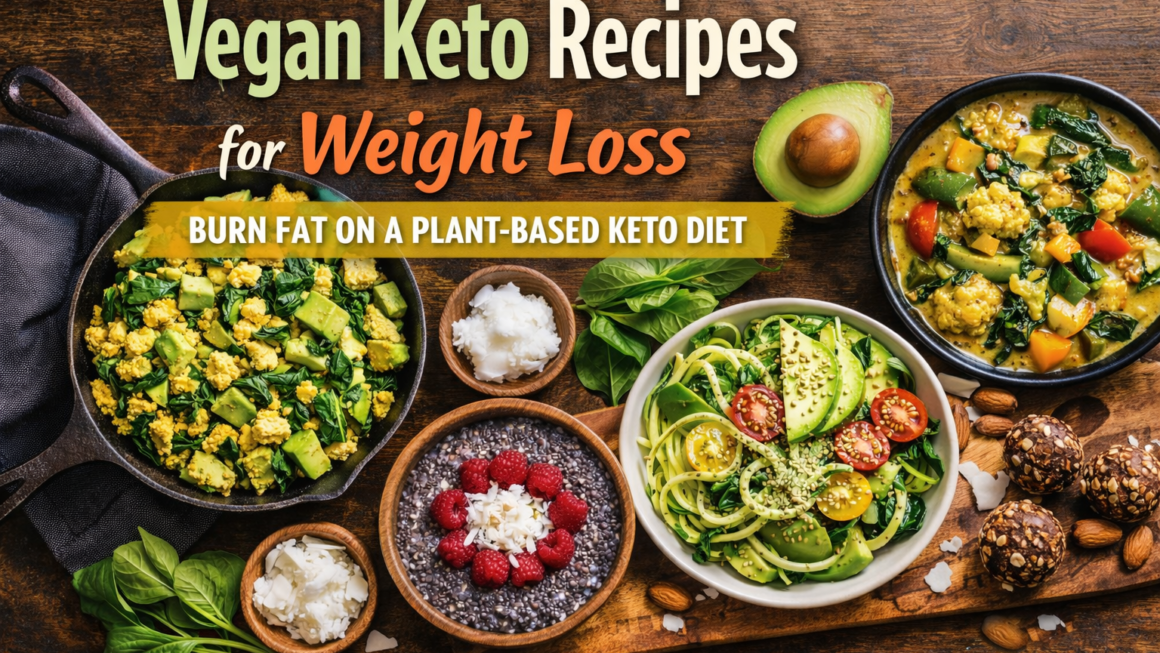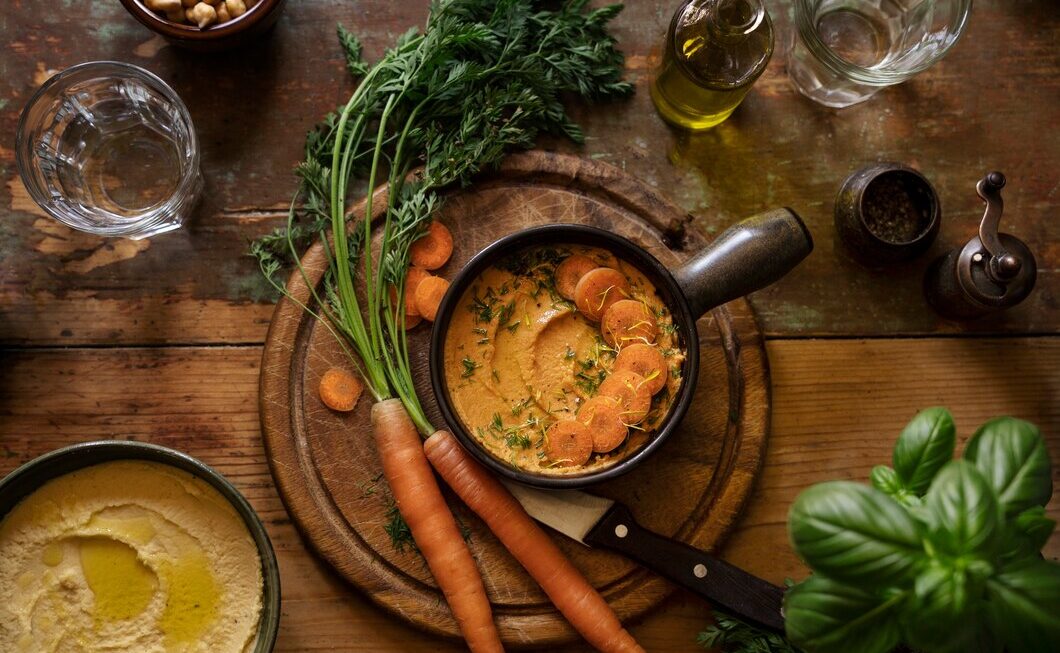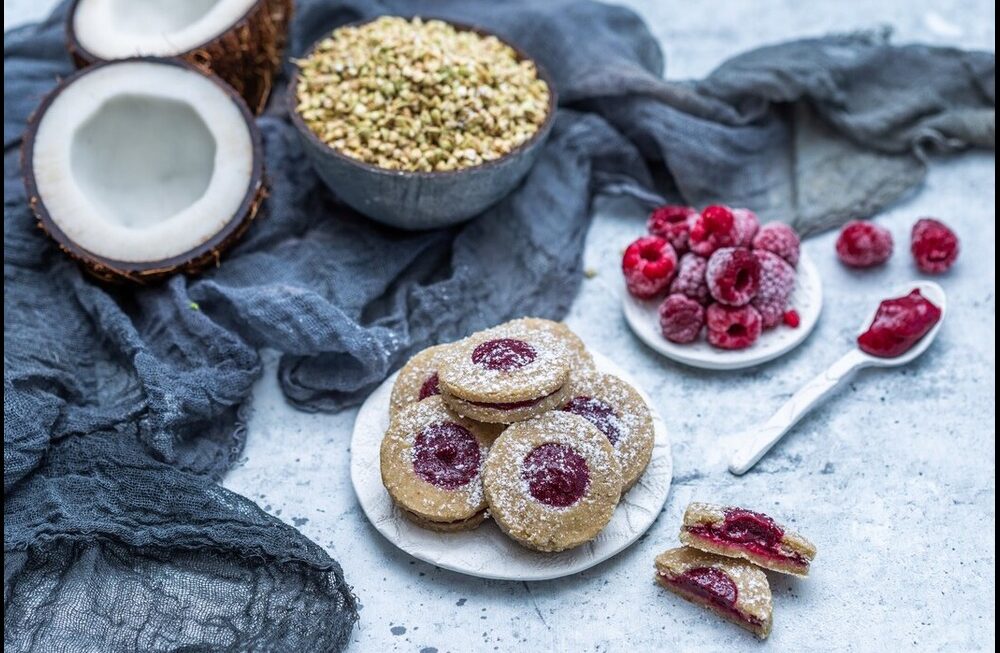The sizzle of food on the grill, the aroma of smoke, the warmth of summer air – barbecues and outdoor grilling are cherished social rituals around the world. While often dominated by meat, the world of vegan BBQ recipes offers an exciting, flavourful, and compassionate way to enjoy this quintessential summer experience. From perfectly charred vegetable skewers and marinated tofu steaks to hearty plant-based burgers and sausages, grilling vegan style is easier and more delicious than ever. This guide explores the techniques, recipes, and considerations for fantastic vegan grilling through the lenses of nutrition, ethics, environment, and practical know-how, offering inspiration adaptable for grills everywhere, including those firing up under the Jaipur sun.
Grill Plant-Powered: Easy & Delicious Vegan BBQ Recipes
LENS 1: Nutritional Analysis (Vegan Healthy Grilling)

Vegan BBQ can be a fantastic opportunity to enjoy delicious food that’s also packed with nutrients, often lighter and healthier than traditional barbecue fare.
- Vegetable Powerhouse: Grilling brings out the natural sweetness of vegetables through caramelization and adds a smoky depth. Quick cooking over high heat helps retain crispness and certain nutrients better than prolonged boiling. Load up skewers with colourful seasonal options available in Jaipur during summer (May/June) like bell peppers (shimla mirch), onions (pyaz), tomatoes (tamatar), zucchini, eggplant (baingan), and corn (bhutta).
- Lean Plant Proteins: Grilling is perfect for:
- Tofu (Extra-Firm): Pressed well and marinated, it holds up beautifully and absorbs smoky flavours.
- Tempeh: Its firm texture grills well, especially when sliced into steaks or cubes and marinated.
- Seitan: Offers a very ‘meaty’ chew, great for skewers or steaks (if available/homemade).
- Legumes (Indirectly): While hard to grill directly, pre-cooked chickpeas or sturdy beans can be added to skewers (carefully) or feature in homemade veggie burgers for the grill.
- Marinades for Flavour & Health?: Homemade marinades allow control over sugar and sodium. Using ingredients rich in antioxidants (herbs like rosemary/thyme, spices like turmeric/haldi, garlic/lehsun, ginger/adrak, lemon juice, vinegar) not only adds flavour but may potentially help reduce the formation of Heterocyclic Amines (HCAs) and Polycyclic Aromatic Hydrocarbons (PAHs) – potentially harmful compounds formed during high-heat cooking/charring of proteins (though research mainly focuses on meat, caution with any charred food is wise).
- Minimizing Grilling Risks: Avoid excessive charring or burning of food. Marinating can create a barrier. Cook food thoroughly but don’t incinerate it. Choose leaner plant options over high-fat processed vegan meats which might drip and cause flare-ups.
- Balanced Plate: Pair grilled items with fresh, cooling salads (like kachumber), whole grains (quinoa salad, millet pilaf), or grilled flatbreads (like roti or naan brushed with oil) for a well-rounded meal. Stay hydrated – crucial when grilling in Jaipur’s summer heat! Remember B12 supplementation for overall vegan health. How can you use marinades with herbs and spices not just for flavour, but potentially for healthier grilling?
Nutritional Deep Dive: Grilling & Health – Maximizing Benefits, Minimizing Risks
Grilling offers benefits like lower added fat compared to frying and great flavour development. However, high-heat cooking, especially with charring, can create potentially carcinogenic compounds (HCAs, PAHs).
- Plant-Based Advantage: Plants naturally lack the specific precursors (creatine, certain amino acids) found in muscle meats that readily form HCAs. PAHs form from fat dripping onto flames/coals and rising in smoke, which can be lower with lean plant foods.
- Minimizing Risk:
- Avoid Burning: Cook until done, but don’t heavily char. Scrape off blackened bits.
- Marinate: Acidic marinades with herbs/spices may reduce HCA formation.
- Use Lower Heat/Indirect Heat: Cook items like dense veggie burgers or sausages partially on indirect heat.
- Clean the Grill: Reduces buildup that can cause smoke/char.
- Focus on Veggies: Vegetables form fewer harmful compounds than meat when grilled.
Voice of Experience (Clinical Dietitian): “Vegan grilling can be very healthy! Focus on colourful vegetables, lean plant proteins like tofu or tempeh, and use marinades rich in herbs, spices, and acidity rather than excessive sugar or salt. Minimize charring, and always pair your grilled items with fresh salads or whole grains for a balanced, fiber-rich meal.” – Sneha Mathur, RD
LENS 2: Ethical Framework (Compassionate Cookouts)

Barbecues are often deeply ingrained social traditions. Embracing vegan BBQ options allows these traditions to continue with compassion.
- Inclusive & Kind Gatherings: Offering delicious vegan BBQ options ensures everyone feels welcome and catered for, challenging the often meat-exclusive norm of traditional cookouts. It’s an act of hospitality rooted in compassion for both animals and guests.
- Positive Advocacy Through Flavour: Serving mouth-watering grilled vegan skewers, burgers, or marinated tofu is one of the most effective forms of advocacy – showing people firsthand that vegan food is satisfying, flavourful, and perfect for celebratory occasions, rather than lecturing.
- Ethical Sourcing for Outdoor Meals: Extend ethical considerations to sourcing: choose locally grown seasonal vegetables from Jaipur markets, Fair Trade spices or sauces for marinades, and ethically produced tofu or plant-based meats.
- Reducing BBQ Waste: Outdoor gatherings can generate significant waste. Plan portion sizes well, encourage reusable plates, cutlery, and napkins, provide clear recycling/composting bins, and find creative uses for leftover grilled veggies (in salads, sandwiches, pasta).
- Celebrating Community Ethically: Grilling together is about community and shared enjoyment. Vegan BBQ allows this celebration to happen without the ethical cost of animal suffering inherent in traditional meat-based barbecues. How can offering delicious vegan options make your next BBQ gathering more inclusive and compassionate?
Hidden Benefits: Sparking Curiosity & Conversation
Well-prepared, flavourful vegan BBQ dishes often pique the curiosity of non-vegan guests, leading to positive conversations about plant-based eating based on shared enjoyment rather than confrontation.
Voice of Experience (Vegan Event Host): “Hosting BBQs used to stress me out as a vegan. Now, I focus on making amazing plant-based options the star – killer veggie skewers, marinated tofu tikka, black bean burgers. Guests (vegan and non-vegan) love them! It shifts the focus to delicious, compassionate food everyone can enjoy together.” – Ankit Sharma, Jaipur Resident
Critical Reassessment: Beyond the Food – Overall Impact
While the food itself is vegan, consider the overall ethics of a BBQ event. Are single-use plates/cups being used? Is charcoal sourced sustainably? A truly ethical event looks at the whole picture, not just the absence of meat.
LENS 3: Ingredient Science & Environment (Sustainable Sizzle)
Understanding the science of grilling plants and the environmental context leads to more sustainable and delicious results.
- Grilling Science on Plants:
- Maillard Reaction & Caramelization: High grill heat causes sugars and amino acids in vegetables and marinated tofu/tempeh to react, creating complex brown colours and deep savoury/sweet flavours.
- Marinade Action: Marinades use acids (vinegar, lemon juice) to slightly tenderize surfaces, oils to prevent sticking and transfer fat-soluble flavours, and salt/sugar/spices to penetrate and season.
- Moisture & Sticking: Plant foods often have higher water content and less fat than meat, making them prone to sticking. Proper oiling of grates and food, and ensuring the grill is hot before adding food, is crucial. Using skewers or grill baskets helps manage smaller items.
- Environmental Footprint: Vegan BBQ is overwhelmingly more sustainable than traditional BBQs:
- Massive Reductions: Grilling legumes (in burgers), tofu, tempeh, seitan, and especially vegetables has a dramatically lower carbon footprint, land use footprint, and water footprint compared to grilling beef burgers, pork sausages, or chicken pieces.
- Seasonal & Local Advantage: Using vegetables currently in season in Rajasthan (peppers, onions, tomatoes, eggplant, corn) minimizes transportation emissions and supports local, often less resource-intensive agriculture compared to globally shipped produce.
- Grilling Fuel: The environmental impact varies by fuel source. Natural gas and propane generally have lower emissions than charcoal briquettes (especially those not sustainably sourced). Electric grills’ impact depends on the electricity source.
- Reduced Processing: Grilling whole vegetables or minimally processed tofu/tempeh is generally less energy-intensive than producing highly processed commercial vegan sausages/burgers, though all are still far better than meat options. How does the choice of grilling vegetables and tofu instead of meat significantly reduce the environmental impact of your summer BBQ?
Market Transformation Map Suggestion: Data showing the year-over-year growth in sales of commercial vegan burgers and sausages specifically marketed for grilling during summer months in key markets (including potentially emerging trends in India).
Voice of Experience (Environmental Food Analyst): “Shifting BBQs from meat-centric to plant-centric offers huge environmental gains. The resources required to produce a kilogram of beef are vastly greater than those for tofu or vegetables. Grilling seasonal, local plants is one of the most sustainable ways to enjoy an outdoor cookout.” – Dr. Meera Singh, Climate & Food Systems Researcher
LENS 4: Everyday Practitioner’s Experience (Recipes, Grilling Tips & Marinades)

Let’s get grilling! Here are practical tips and recipes for delicious vegan BBQ.
What to Grill (Vegan Style):
- Vegetable Skewers (Sabzi Seekh): Chunks of bell pepper (shimla mirch), onion (pyaz), zucchini, cherry tomatoes, mushrooms, corn on the cob pieces, pineapple, par-boiled potato/sweet potato cubes. Marinate before threading!
- Tofu/Tempeh/Seitan: Cut into steaks, cubes, or triangles. Press extra-firm tofu well! Marinate for at least 30 minutes (longer is better). Grill until nicely marked and heated through.
- Vegan Paneer Tikka: Use extra-firm tofu, pressed very well and cut into cubes, or a store-bought/homemade firm vegan paneer alternative. Marinate in a thick vegan yogurt (plant-based dahi) based tikka masala marinade (with ginger-garlic paste, lemon juice, gram flour/besan, and spices like turmeric, chili, coriander, cumin, garam masala). Thread onto skewers with onion and pepper chunks. Grill until charred slightly.
- Portobello Mushrooms: Brush with marinade or oil, grill cap-side down first, then flip. Great as burger patties.
- Corn on the Cob (Bhutta): Grill directly in husk (soaked first) or shucked and brushed with oil/vegan butter. Serve with salt, chili powder, and lime – classic Indian street food style!
- Commercial Vegan Burgers/Sausages: Follow package instructions. Usually grill well. Many Indian brands like GoodDot, Blue Tribe, Imagine Meats offer options. Availability may vary outside major cities; check online retailers or larger stores in Jaipur.
- Fruit: Pineapple slices, peach halves, thick watermelon steaks grill beautifully and caramelize nicely.
Essential Marinades & Sauces:
- Basic BBQ Marinade: Plant Oil + Acid (Vinegar/Lemon) + Soy Sauce/Tamari + Sweetener (Maple/Jaggery) + Garlic Powder + Onion Powder + Smoked Paprika + Black Pepper.
- Lemon-Herb Marinade: Olive Oil + Lemon Juice + Minced Garlic + Fresh Herbs (Rosemary, Thyme, Oregano, or Coriander/Mint) + Salt + Pepper.
- Tikka Marinade (Vegan): Thick Plant Yogurt + Ginger-Garlic Paste + Lemon Juice + Besan (Gram Flour – thickener) + Turmeric + Kashmiri Chili Powder + Coriander Powder + Cumin Powder + Garam Masala + Salt + Oil (optional).
- Peanut Sauce (for dipping/glazing): Peanut Butter + Soy Sauce + Lime Juice + Maple/Agave + Ginger + Garlic + Water (to thin) + Chili Flakes (optional).
Grilling Techniques:
- Prepare the Grill: Clean grates thoroughly. Preheat grill properly (medium-high usually good).
- Oil the Grates: Just before adding food, oil the hot grates using a folded paper towel dipped in high-smoke point oil held with tongs. This prevents sticking. Lightly oiling the food itself also helps.
- Direct vs. Indirect Heat: Use direct heat for quick searing (vegetables, thin tofu). Use indirect heat (cooler side of grill) for thicker items (burgers, sausages, dense tofu steaks) to cook through without burning.
- Don’t Move Food Too Soon: Let items sear properly to get grill marks and release easily before flipping.
- Use Tools: Skewers are essential for smaller items. Grill baskets are great for delicate vegetables or tofu cubes. Long-handled tongs and spatulas are crucial.
- Watch for Flare-Ups: Have a spray bottle with water handy for minor flare-ups, especially if using oilier marinades.
- Check for Doneness: Vegetables should be tender-crisp and slightly charred. Tofu/tempeh should be heated through with good grill marks. Commercial products as per package.
- Jaipur Heat: Grill during cooler parts of the day (early morning, late evening) if possible during intense summer heat. Stay hydrated!
What marinade flavour profile (BBQ, Tikka, Lemon-Herb, Teriyaki) would you most like to try on grilled tofu or vegetables?
Daily Impact: Marinade Magic
Make a large batch of your favourite marinade and keep it in the fridge. Use it throughout the week to quickly flavour tofu, tempeh, or vegetables ready for grilling, pan-frying, or baking.
Voice of Experience (Weekend Grill Master): “My top tip for vegan grilling is pressing tofu REALLY well and marinating it overnight – makes a huge difference! And always oil the grates right before putting the food on. Those colourful veggie skewers marinated in lemon-herb are always a hit at our family BBQs.” – Vikram Singh, Jaipur
Alternative Approaches: Indoor & Foil Packets
- Grill Pans: Use a cast iron grill pan on the stovetop for grill marks and smoky flavour indoors. Ensure good ventilation.
- Foil Packets: Toss vegetables and tofu/beans with marinade and seasonings, seal tightly in foil packets, and cook on the grill (or even in campfire coals) for easy cleanup and moist results.
PERSPECTIVE INTERSECTION MATRIX
- Nutrition & Technique (Lens 1 & 4): Grilling techniques (Lens 4) that minimize charring align with nutritional goals (Lens 1) of reducing potentially harmful compounds. Marinade choices (Lens 4) impact both flavour and nutritional profile (Lens 1).
- Ethics & Inclusivity (Lens 2 & 4): Offering practical, delicious vegan BBQ recipes (Lens 4) makes social gatherings more ethically inclusive (Lens 2). Conscious sourcing (Lens 2) informs ingredient choices (Lens 4).
- Environment & Food Choice (Lens 3 & 4): The significantly lower environmental impact of plant-based grilling (Lens 3) is realized through the practical choice of grilling vegetables, tofu, or vegan burgers (Lens 4) instead of meat.
- Science & Results (Lens 3 & 4): Understanding Maillard reaction and marinade science (Lens 3) helps practitioners achieve better flavour, texture, and prevent sticking when grilling (Lens 4).
- Practicality & All Factors (Lens 4 & 1/2/3): Successful vegan BBQ (Lens 4) integrates nutritional considerations (Lens 1), ethical hosting/sourcing (Lens 2), sustainable ingredient choices (Lens 3), and effective techniques.
MISCONCEPTION ANALYSIS
| Misconception | Reality |
| Vegan BBQ is just boring grilled vegetables on a stick. | It encompasses much more! Marinated tofu/tempeh steaks, flavourful vegan sausages & burgers, grilled portobellos, corn on the cob, creative vegetable skewers with dipping sauces – it can be incredibly diverse and satisfying. |
| Plant-based foods always stick to the grill or fall apart. | Proper preparation prevents this! Press tofu well, use firm ingredients, marinate (oil helps prevent sticking), clean and oil the grill grates thoroughly right before adding food, don’t move food too soon. Use skewers/baskets for smaller items. |
| You can’t achieve that smoky BBQ flavour without meat drippings. | Smoky flavour comes from the grilling process itself (char), wood chips (if used), and ingredients in marinades/sauces like smoked paprika, liquid smoke (optional), chipotle powder, or BBQ sauce. |
| Vegan BBQ options aren’t hearty or satisfying enough for a main course. | Marinated tofu/tempeh/seitan, hearty veggie burgers, vegan sausages, or substantial skewers paired with sides like potato salad, corn, bean salad, and bread provide plenty of protein, fiber, and satisfaction. |
| Grilling vegetables destroys all their nutrients. | Quick grilling can actually retain certain nutrients better than long boiling. While some loss occurs with any cooking, grilling is generally considered a healthy way to prepare vegetables, especially compared to deep frying. |
KEY TURNING POINTS
- Growth of Outdoor Grilling Culture: BBQ becoming a major form of social gathering and summer cooking.
- Rise of Veganism/Plant-Based Eating: Increased demand for options beyond meat for all eating occasions, including BBQs.
- Development of Grill-Friendly Plant Proteins: Availability of extra-firm tofu, tempeh, seitan, and commercial vegan burgers/sausages specifically designed to hold up on the grill.
- Food Media & Bloggers: Showcasing creative and appealing vegan grilling recipes and techniques, inspiring home cooks.
- Increased Health & Environmental Awareness: Consumers seeking lighter, more sustainable alternatives to traditional meat-heavy barbecue fare.
SYNTHESIS & RECOMMENDATIONS
Fire up the grill, because vegan BBQ recipes offer a world of delicious possibilities for warm-weather gatherings and flavourful meals! From vibrant vegetable skewers marinated in zesty herbs to satisfying tofu tikka, hearty plant-based burgers, and perfectly charred corn, compassionate cooking on the grill is accessible, exciting, and significantly more sustainable than traditional meat-based barbecues. Success lies in smart preparation – pressing tofu, flavourful marinades, proper grill prep – and embracing the bounty of seasonal vegetables. Whether you’re a seasoned vegan or just exploring plant-based options, vegan BBQ proves that ethical eating can be undeniably celebratory and delicious.
Recommendations for Great Vegan Grilling:
- Press Your Tofu: Remove excess water from extra-firm tofu for at least 30 minutes for better texture and marinade absorption.
- Marinate Generously: Use flavourful marinades with oil, acid, herbs, and spices for tofu, tempeh, seitan, and vegetables. Allow at least 30 minutes.
- Prep Your Grill: Clean grates thoroughly and oil them well just before adding food to prevent sticking. Manage your heat zones (direct/indirect).
- Think Skewers & Baskets: Use skewers for smaller vegetable pieces and tofu/tempeh cubes. Use grill baskets for delicate items.
- Embrace Veggies: Grill a wide variety of seasonal vegetables – they take on amazing flavour.
- Don’t Burn: Cook until tender and nicely marked, but avoid excessive charring.
- Have Sides Ready: Complement grilled items with fresh salads, slaws, grain salads, or grilled bread.
- Adapt Local Flavours: Try Indian marinades like Tikka or Tandoori on tofu or vegetables for a local twist.
FURTHER AREAS OF EXPLORATION
- Top 5 Vegan Marinade Recipes for Grilling Everything
- How to Grill Tofu Perfectly (No Sticking, No Crumbling)
- Best Store-Bought Vegan Burgers and Sausages for the BBQ (Review)
- Creative Grilled Vegetable Platter Ideas & Dipping Sauces
- Making Vegan Seekh Kebabs for the Grill
- Grilling Fruits for Vegan Desserts
- Essential Tools for Successful Vegan Grilling












